The Oklahoma City duo Brainwasher—comprised of two members of the Flaming Lips, Tommy McKenzie and Matt Kirksey—appeared on the Zoom camera together, almost elbow to elbow, with a budding energy. Their boisterous but calm vibes seeped through the interwebs and set the tone for our conversation. This rapport between longtime friends and musical coworkers is captured in a record that exudes their relationship, producing a melodic, playful, warm, and exploratory ten-piece sonic essay. Not to mention, the album is inspired by Portishead, Nick Cave, and David Lynch's surreal universe. 39 Lightyears from Heaven dips into deep head-slogging grooves with songs like the title track "39 Lightyears from Heaven," "A1A," "At Least It Beats an Actor," and methodical, spacelike peregrination soundscapes in songs like "Silver and White" and "Home."
Living in Oklahoma City, Brainwasher are aware that they live far from the flashing lights of New York or Los Angeles, and though it may not directly correspond, their removal of ego as musicians is prevalent and intentional. In that, it seems they have found freedom in movement in their artistry and expression, infusing their work with love. Their process may have been sporadic due to their commitment to the Lips, their families, and other bands, but they took advantage of all the little moments—through curiosity, intuition, and care for their music and each other—to make 39 Lightyears from Heaven.
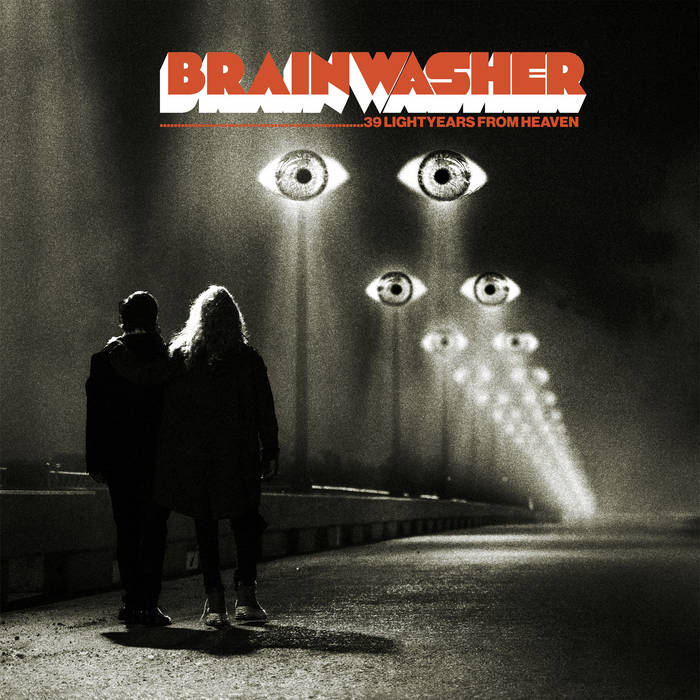
Jonah Evans: How are you guys doing today? Are you practicing since you're going on tour in a week?
Matt Kirksey: Not right now. With the Flaming Lips, we only really practice right before we go out to start a run. So we just did three and a half or four weeks of shows. Before we did that, we did a week of rehearsal, which those rehearsals are pretty intense. It's practice, but it's also lighting, video, and stuff like that. Now, we just have a ten-day break before we start back up. So we're really not doing any practicing right now.
Tommy McKenzie: And with Brainwasher, we have a show this Friday in Oklahoma City, so we're planning that out before...
Matt: I guess we are practicing for that. (laughter)
Jonah: You guys have so many bands, I don't know how you keep track.
Matt: Apparently not very well. I forgot we had a show this Friday.
Jonah: So, I don't know a lot about Oklahoma City, but it seems like it's an important place for you guys. Can you tell me a little bit about what the city means to you?
Tommy: I spent most of my childhood here, and when it comes to music or art, it seems like there are a lot of different kinds of bands and sounds coming out of the city, including Flaming Lips, which is really inspiring. You can go in so many different directions. There's obviously the country thing, but there is a lot of weird freak art, and there's a punk scene, and there's just this wild little underbelly. Any beaten path is a legitimate sort of thing over here.
Matt: I think the reason there are a lot of cool and different things going on here is that it's still a place that you can afford. The cost of living is really low. It's relatively easy to find a space compared to a big city if you’re making visual art or throwing plays or shows. There are a lot of things about it that are dark and that suck. The politics are awful. But the people are fucking cool.
We're both born and raised here, and it's home for us. I love it here. If I were stuck here and never got to leave, I might want to live somewhere else, but it's a great place to come home to for sure.
Tommy: It's a calming thing to come back to. It's also equidistant from so many places. So you can get to Kansas City as easy as Austin or Albuquerque, even Chicago. It's not terribly backbreaking.
Matt: New York City and Los Angeles are the same distance away from each other from here.
Jonah: Any Oklahoma City bands besides the Flaming Lips that you guys are like, "Oh man, I love this hometown band"?
Matt: There's so much cool shit happening. There's a band called Chat Pile that's from here.
Jonah: Oh, I know them. They're so good.
Matt: It’s been fun to watch them kill it. There are so many great little nuggets in their music and art that refer to Oklahoma City, which is really cool.
Tommy: The community here is small enough music-wise that we all know each other. I mean, we played in each other's bands and shit.There’s Broncho, Samantha Crain—Matt played drums on her last record. There was this great band called Colourmusic. There's this great venue in Norman, Oklahoma, called Opolis, run by Andy and Marian Nuñez, who were in the Starlight Mints. Everybody came through there at one point.
Matt: Every band played there on their way up. That place was like a second home for both of us. That's how we learned how to play in bands. We learned things like how to get our shit off the stage quick—important stuff. Vampire Weekend opened for my college band there. I can always say they opened for me. (laughter)
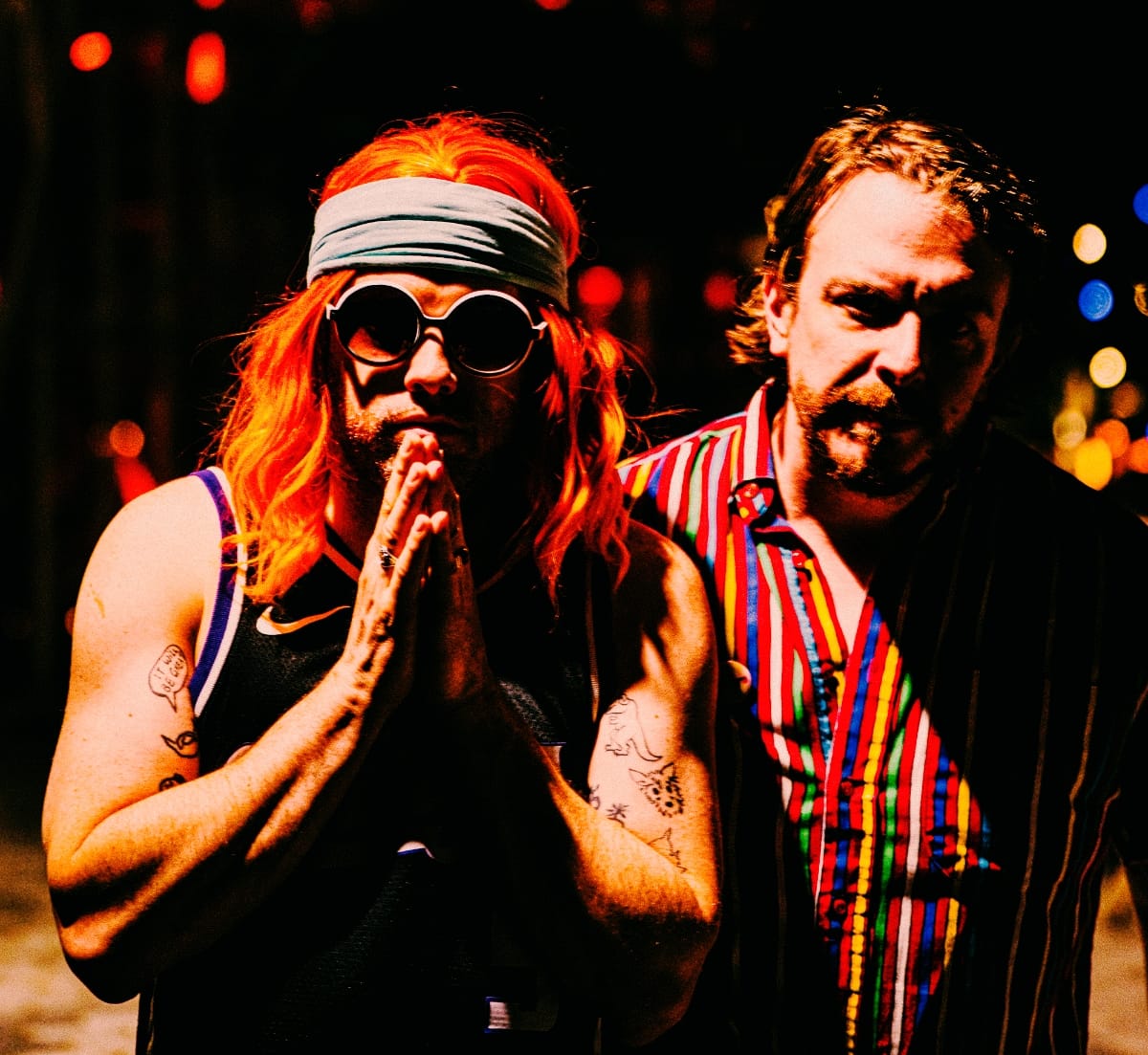
Jonah: What brought you together for the idea of this project? I've heard you've been tinkering with it for a long time.
Matt: We've been doing stuff together for a long time and can work in a way with each other that isn't precious. That allows us to take chances. We might work on something for a week and then be like, "What if we scrap those drums and hit this glass bottle with the drumstick instead?" We trust each other enough to take chances in that way, which is cool for me.
Tommy: We had played with so many different people in Oklahoma, so you get used to people's sensibilities. The first time we played together was on the patio of a Mexican restaurant in Norman, Oklahoma, and I think we’re both attracted to this kind of chaotic energy. Musically, we could always just lock into each other. And then there’s this shared intuition that’s always there in some iteration, to the point where we could, like Matt said, both be honest, brutally honest with each other. So there is a true, deep line of communication we've had for . . . Jesus, like fifteen or so years.
Jonah: When did the intuition start leading into conversations about the music that you're making?
Tommy: I remember going through a breakup, and Matt's like, dude, here's all these movies, this music, and this art that you need to experience, [all with this] feeling that you're having right now, which is maybe longing. So it was Twin Peaks, it was Phases and Stages by Willie Nelson.
So that was just this immediate relation of that kind of vulnerability you're in, and a weird nostalgia for that when you've been dumped. That feeling, and watching David Lynch, helped start Brainwasher. We had that base communication, and then it was like, what would that sound like? Then we started going from there.
Matt: We always knew we wanted to make a record that was just us. We were always writing songs together and for other bands, but we thought, "What would it be like if it was just us?" and we could really do what we wanted to do. I was more confident in doing that with Tommy than anybody else because we like the same shit, you know? We bond over things like Nick Cave and the Bad Seeds, and I've always wanted to make music that sounds like that, but I just haven't known how. And then we kind of figured it out together. Portishead, things like that, that we both love, that we're like, "Well, what if we just try to make something that sounds like this?" Go from there.
Jonah: So this is your first child together?
Matt: (laughter) Yeah, that's a way to say it. And I've already got an eight-month-old in the other room over here.
Jonah: Something I wanted to ask was what the function of a sampler is in your guys' eyes. What is it to you, and what makes you drawn to it?
Matt: When I think of a sampler, I think of Portishead printing their drums onto a vinyl record. Then they could play their drums off vinyl and fuck with it to get the sound they wanted. That's what a sampler is to me. We've used every type of sampler through different things we've done. I’m a drummer, but it allows you to look at music from a different way, where you don't have to think of it as, "I've got to sit here and play this drumbeat." You can find a drumbeat that you like, and then you can fuck it up. You can add things to it and chop it up. It’s just freeing to make music that way for me, you know?
When we made this Brainwasher record, we made a big chunk of it in Savannah, Georgia, at a friend's house. We set up a little studio. We didn't have a drum set, so we started creating drum sounds using stuff in the house. We would slam the dryer door and record it. And then we would put that on a little MIDI sampler and use that as a snare drum. We'd take the liquor bottles, and we'd sample those, and we'd just beat on the wall for a kick drum. A lot of the drum sounds you hear on the record are just stuff like that.
Jonah: That sounds like it gives you a lot of freedom. Not only can you get samples from whatever's on the programs, but you can also just knock on a door or look at something and think, "I wonder what that sounds like?" and mess with it.
Tommy: Yeah, and playing it live, it really liberates you to truly make this thing that you want to do and then to figure the rest out later. Since we've been playing that stuff live, it's been really, really fun.
Jonah: What was the general sense of how you guys created this record? You did a lot of it in the house. Were you sitting around having conversations about what you should bang on, or did you guys sometimes jam out?
Matt: We just go, you know what I mean? There's not a lot of conversation about "What if we did this?" or "What if we moved it in this direction?" We just start throwing shit at the wall and see what sticks. Necessity is the mother of invention, right? We just kind of see what we end up with. We never worry about whether something doesn't get used, because we can use it for something else. There's a thing that we started working on for this Brainwasher record that I think might become a Flaming Lips song on their next record. We're just really open with that kind of stuff. Or, if it doesn’t fit the sound of this project and gets put on the back burner, maybe it'll be on the next record.
Jonah: What are some songs or sounds that have surprised you that you produced?
Tommy: This whole thing started about five years ago. We did a cover of the John Prine song, "Angel from Montgomery." We were like, let's just do this cover of this, after he had passed away. And then it was, "Okay, this sounds like us already.” Then, as far as sounds, that synth descending on "At Least It Beats an Actor" sounds like a video game helicopter crashing. And then there were some things from us recording at home that we just kept as is.
Matt: We're good at not overproducing things. If we like a sound the way it is, we'll just leave it, even if it's just a phone memo. We try to combine things that are hi-fi and well-recorded with things like that beat on "At Least It Beats an Actor." The loop isn't perfectly in time. When we started getting serious about that song, the guy producing it with us—his name is Taylor—his nature is to go chop that up and time correct to make it perfect. I was like, "Whoa, dude! We've got to keep that how it is!" The push and pull of that is what makes it cool.
The last song on the record, "Try," has also really surprised me. In my mind, it was going to be this delicate, quiet, and smooth end to a record. It would kind of lull you to sleep at the end, you know? And Taylor and Tommy were like, "What if we got big with this?" I was adamantly against it. At first, I was like, "No way, dude. It takes away from what the song's about." Earlier, I said I didn’t get precious about things, but I did then. I was thinking this already had this place in my mind of how it goes. And they're like, "What if we made it huge? What if we made it loud?" And now that it's done, I love it. It's such a cool moment to kind of scare you at the end. That's why we try to keep an open mind with that kind of stuff, because all the time you can get surprised by your own shit.
Jonah: When I was listening to "Try," I was like, "Okay, yeah, chill and a little distorted," and then it was just this wall. What's that song about?
Matt: That song's about a couple of things. I was adopted as an adult by my stepdad. I guess it's probably been about ten years, maybe more now. It was something that I wanted to do. I tried to tell him that I wanted to do that, but I was scared to. Then, I had some other friends dealing with heavy, suicidal things with some family members. You just have these times in life when things are hitting you so fast, you feel like you're in a kind of a coma. You can't really react to things. And I was just forcing myself to react, forcing myself to deal, to tell these people that I love them while I could because, man, you never know when you might have another chance. So, I was just kind of trying to tell those stories in maybe a cryptic way, in a way that made sense to me, and I could get it off my chest without it sounding like I was too emo.
Jonah: I like that, because a lot of the vocals are scaled back, but still there, a little seething, in a good way, and allowing the song to breathe. I think you guys did a really cool job with that.
Tommy: Yeah, even just the sound of it to me just sounds like how grief works. It's like you're kind of in a pretty little moment, not thinking about it, and then boom, the void hits and you're like, "Oh my fucking God." And then it lets up. It’s those sorts of emotional things—it just really sneaks up on you, and when it happens, even years later, it gets so violent. Then it finishes, just like it has that little moment once.
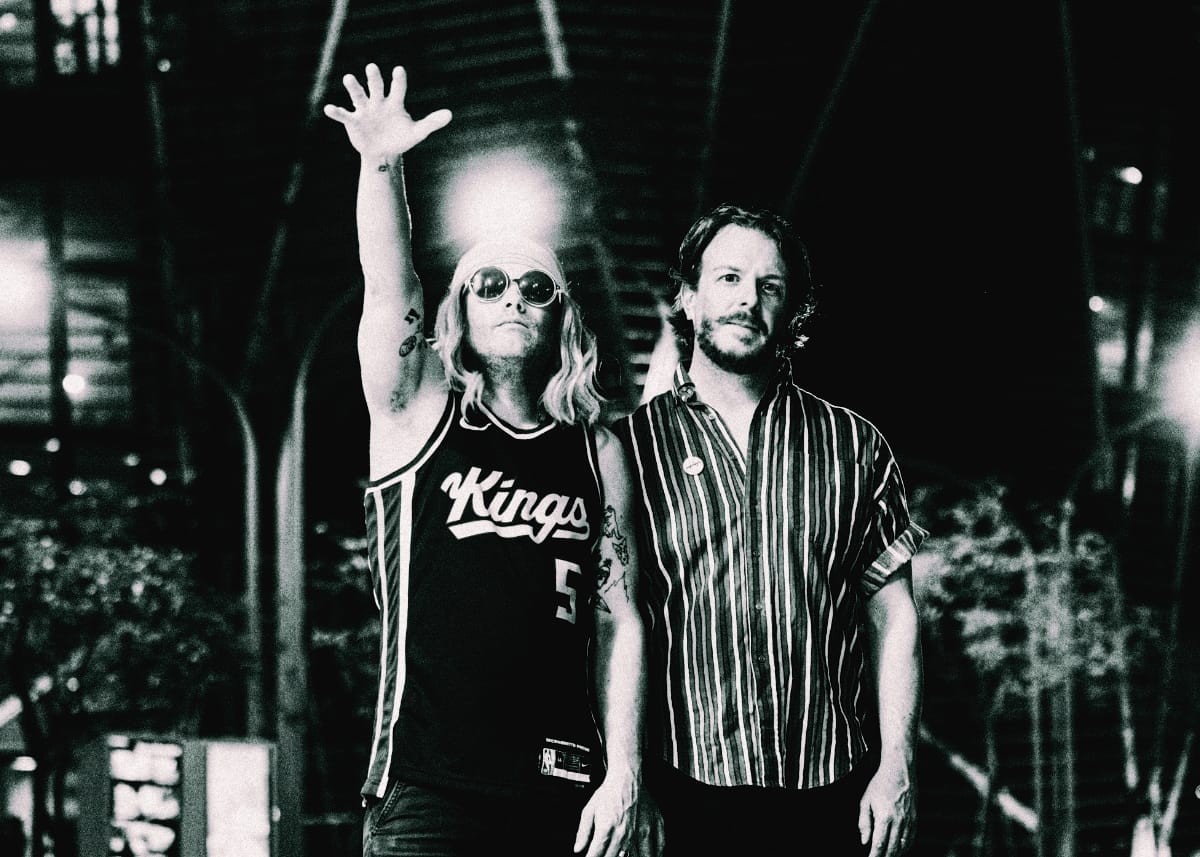
Jonah: There's another surprising moment in the song, "39 Lightyears from Heaven." There's this industrial soundscape levied by a thick bass sound and ghostlike vocals. Near the last thirty or forty seconds of the song, there's this warm bass-tone lick. It feels groovy and could easily fit in another song, but it makes the song sound pop with a nice contrast. It's also your title track, so maybe there's a meaning behind it?
Tommy: That's the age-old story of the record, as it's named after the last thing we recorded. (laughter) So that was a Flaming Lips jam that we had maybe three years ago or something.
Matt: From soundcheck.
Tommy: There's just an iPhone video of it, of that weird pulsating bass thing, and then Matt playing drums. We used that, and then took it to the studio. I think we were adding these things to it, and the person we made that one with, Taylor, came up with the idea to add that. It really breaks it up. I think in our minds we're still making this trip-hop record, like a psychedelic trip-hop record.
Matt: Taylor Johnson is the producer on quite a bit of the stuff on this record. He's good at that. We'll get into some of these songs that are monotonous and long, but he comes from a world of pop music, and he's terrific about finding little moments to put some of those candies in there that take you out of this dark place. With the lyrics of that song, my wife was going through hell with family stuff, her grandparents and parents getting older, and for me, that song just kind of popped out almost instantaneously. It's cathartic, like therapy to get that stuff out, not even into the world, just out of you. When I go back and listen to it, I can remember exactly how I felt and exactly where I was when I was writing it. It's a good feeling to have.
Jonah: What's the idea behind the album being like a ten-song sonic essay?
Tommy: Some of that is attributed to the fact that some of the songs range between seven and ten years old. There's that song, "Candles," that we started at Wayne [Coyne]'s studio in his house. A couple of the others, we started with our friend Trent Bell, who records in Norman at Bell Labs; he was in the Chainsaw Kittens. So some of them were recorded over the years. When we finished everything with Taylor, we're like, "How do we wrap all of these things together?" But it was all wrapped up really well. I think it's just that our tastes are evolving a little bit, but we’re still staying in the ballpark of what this band and record mean to us as individuals.
Matt: The other day I was talking to our friend Jake, whose band's called Spaceface. He was worried and had thoughts like, "Do these songs work together? Is this a cohesive record?" I worry about that stuff all the time with my music, but I think more often than not, I don't often hear records that sound like the songs don't belong together. I think maybe just the nature of making art. It's like if you're a painter, usually your paintings all kind of look the same. Maybe we're just lucky that it came together. I don't know if we were necessarily intentional about that, or if we just got lucky.
Jonah: What is it about trip-hop music that attracts you guys to it? What is it doing sonically that stands out to you that you want to play with?
Tommy: It's just a comforting thing. These are some of my favorite songs ever, and some of these aren't necessarily trip-hop, but they're in that same ilk. There's "Your Woman" by White Town. There's "Tom's Diner.” There's that song "Damn I Wish I Was Your Lover" by Sophie B. Hawkins. I feel like I'm better at just personally creating music and sounds to correlate with how I'm feeling. And he [Matt] has a much better capability of doing that with words. That's why we work so well together. But I think just as a sonic palette, that kind of music, including krautrock and even something like the band Air, there are these tones and sounds that I always found very stimulating and calming at the same time.
Matt: The Flaming Lips were on tour in Australia around 2011, and we did this traveling festival with Portishead. So we got to hear them every night, and I was fascinated by how Beth Gibbons’ vocals sat on top of that music. It was so cool because it felt like she wasn't even worried about what the band was doing. She had these melodies and words that would sit on top and bounce across the music these people were creating. It was so emotional and raw, and that just stuck with me. You have these moments in your life where you hear these records, or you see these shows, and that changes you. And I would just listen to them every night and hear how effortlessly she could sing on top of that stuff. I thought it was amazing, and I wanted to try to sing in that kind of way.
Jonah: You mentioned staying away from ego. That's something that I've been a little obsessed with lately. Does that help your art? I think about artists’ ambitions and the creation of art, and how often it can be hard to escape ego with everything around you. How important is it to stay grounded and keep escaping that?
Matt: It's a balance, right? Because I'm here, I am talking about myself, and what I'm saying about myself is that I try not to have an ego. It doesn't make any sense, but it's tough because when you try to make music or any kind of art, you need to believe in something within yourself. The moment you start believing it and thinking you’re great or something, you lose the delicateness of it. You lose what was great about it in the first place. I mean, Wayne's been singing about that for a million years.
We run into people all the time, these artists that have these egos where you heard their music before, and then you listen to it after, and you hear it in a different way. Luckily for us, we make this music because we like it, and we're lucky because we found a way to survive making art somehow, which is fucking impossible. We've been able to do that, and it allows us then to have a project like this where we can just say, "Well, this is just what we want to do." And if people like it, cool. If nobody likes it, at least we can hold the record and say, "Hey, look, we made this."
Tommy: There's a difference in ego and having confidence in your ideas because they're true to you. I feel like another thing the ego can do is obliterate your sense of wonder and surprise because it makes you feel like you have all the answers. Really, where the sweet spot is, is where you're just taking in new influences and being inspired by things. That's why it's helpful to have Matt with this. It allows us to be stimulated in this new way, as opposed to the music process being such an insular thing. We have two records' worth of ideas already, and they're kind of from all these different experiences and times, and it'll come together in a different way. But we're always excited about new things as much as we want to keep in this realm where we know the band exists. It's important to still be excited by things and not think that you inherently know everything.
Check out more like this:
 The TonearmJonah Evans
The TonearmJonah Evans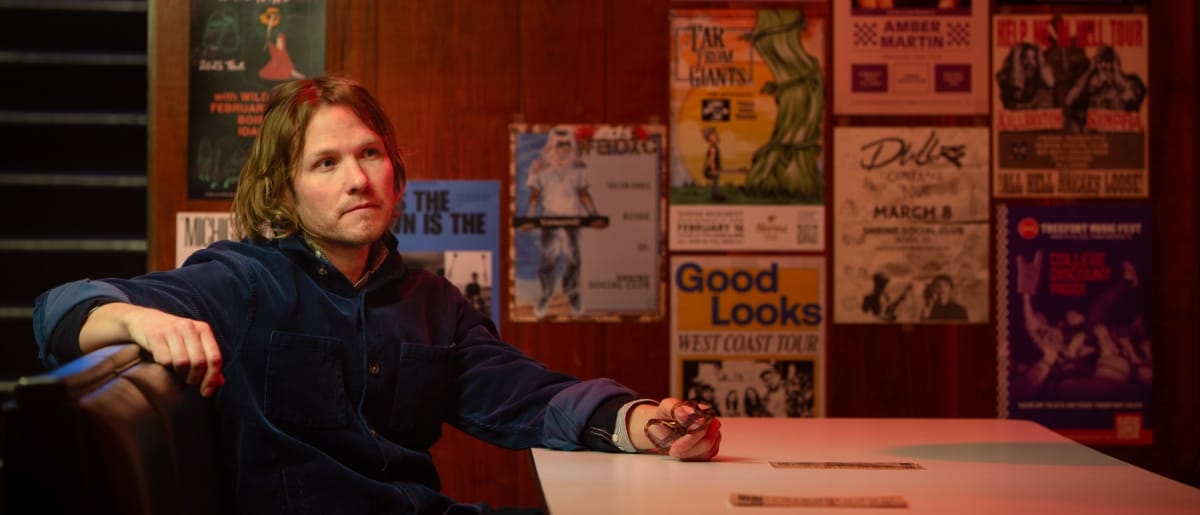
 The TonearmPeter Thomas Webb
The TonearmPeter Thomas Webb



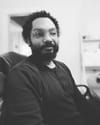

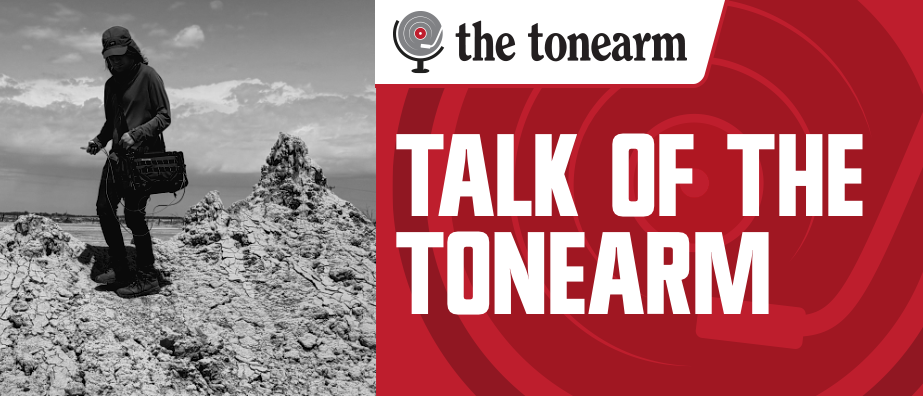
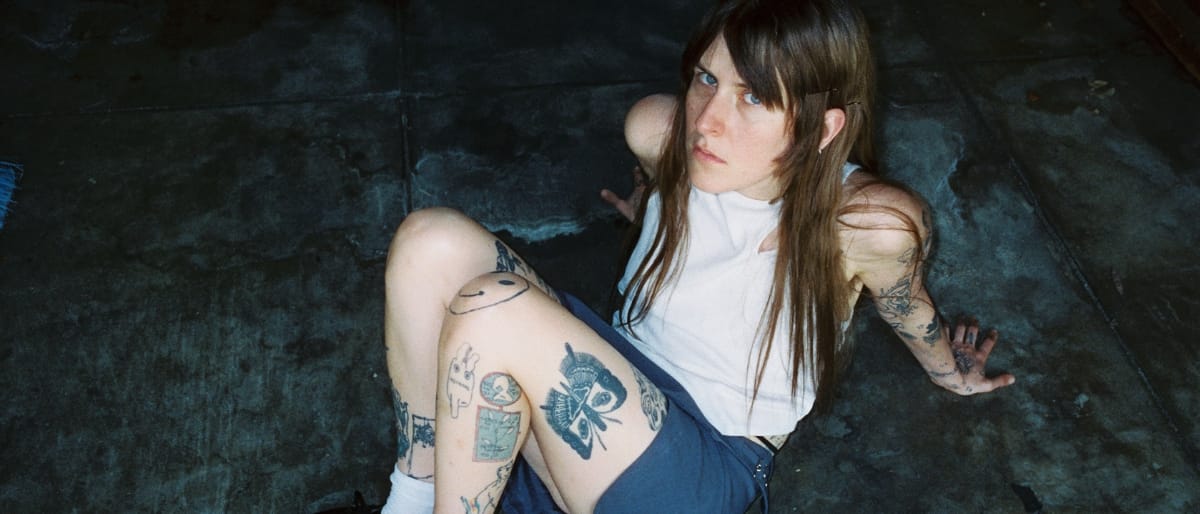
Comments